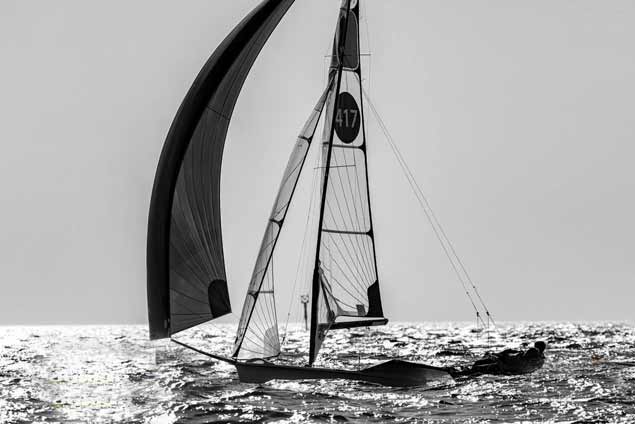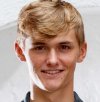Robert Dickson won the Junior 49er World Championships in France last month and here he describes how victory in Marseille came through years of preparation with this long-term sailing partner Sean Waddilove (21).
Believe it or not this is our first win in 49er sailing! Unlike the Laser class where many sailors have gone from club level and gradually progressed to World Class, all our 49er racing has been international.
We began sailing when we were very young. I began sailing in Lough Ree with my sister and brother and cousins in my red wooden Oppie. Seán began with a 'Taste of Sailing' course in Skerries Sailing Club and immediately fell in love with being on the water. We started club racing and then started the National circuit where we became good friends and represented Ireland in international events such as Palma and the German Nationals.
I then began to sail in Sutton Dinghy Club and finally moved to Howth Yacht Club.
We both joined SRR in La Rochelle for our Transition Year 2013/14, where we trained in our 420 dinghy with the La Rochelle Team.
.
We joined the Irish Sailing Olympic Pathway in Optimists and progressed to the 420 and are now finally in the Olympic Class dinghy, the 49er.
Formula One of Dinghy Racing
The 49er is often described as the Formula one of dinghy sailing. It is fast, technical, addictive and we love it!
We have had to strike a balance between training, racing and studying. DCU and DIT support this through their Sports Scholarship Programmes. We depend a lot on wifi in the evenings to catch up on lectures!
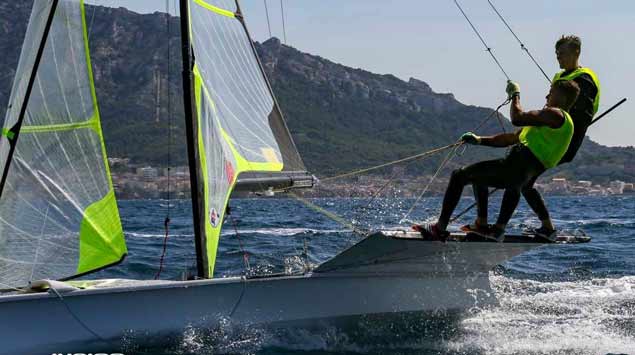
Training with the 49er Development Squad and having a 100% committed coach makes training much more effective. You can train solo but it’s not as effective as having a group of boats around you, pushing each other on and off the water to strive to be the best. This medal was certainly a
team effort!
We have had support all along from:
- Family
- Sailors
- Coaches: Tytus Konarzewski, Mark McCabe, Ross Killian, Ger Owens, Thomas Chaix, Graham Grant, Phillippe Boudgourd, John and David White, Scott Flanigan and many more.
- DCU and DIT
- Clubs: HYC. SSC, SDC, LRYC, SRR
- Institute of Sport
- Sport Ireland
- Irish Sailing
We were invited early in 2015 to join the recently developed 49er Development Squad and started training in June 2015 with Seán and Tadgh Donnelly and Mark Hassett and Oisín O’Driscoll down in Schull Sailing Centre.
Twelve knots felt like twenty
For the first year sailing 49ers, we didn’t even dream of trying to sail in a regatta. We spent a lot of time upside down trying to learn how to get around a course and learning how to fix everything we broke after being smashed around the boat. The 49er felt so much more powered up than the 420. Twelve knots felt like twenty.
The group became better and better together all learning from each other.
Irish Sailing got us a passionate and dedicated coach Tytus Konarzewski from Poland for the Squad in September 2015. Tytus put in a huge amount of work with us and really helped us a lot in many ways on our path to winning the U23 Worlds.
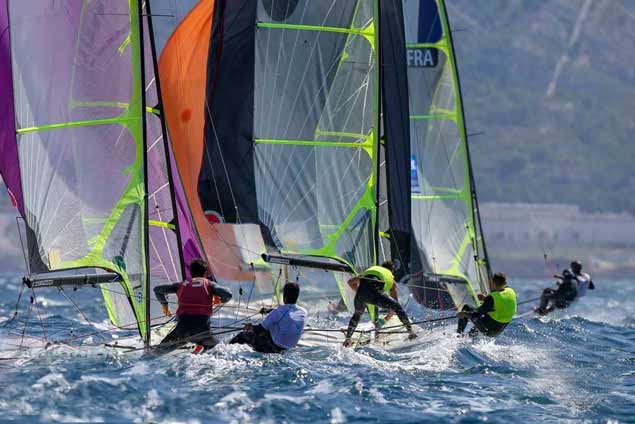
Our Strength and Conditioning was guided by Mark McCabe at SportsMed Ireland. His knowledge and expertise Mark improved our fitness to that of World Class athletes.
Together we all travel to events and training camps. For the last three years, we had some really productive training together pushing ourselves and each other to get better. We learned a huge amount from our coach and teammates. This was the key to success. Over the last two years, we spent a lot of time training in Cadiz and Palma to escape the Irish Winter. Interestingly last year we stayed as long as we could in the stormy freezing Dún Laoghaire harbour right through to December. In comparison, sailing in warm sunny France was much easier!
This season we sailed six regattas Princess Sophia, Medemblik, Kiel, Gydinia, Aarhus and Marseilles.
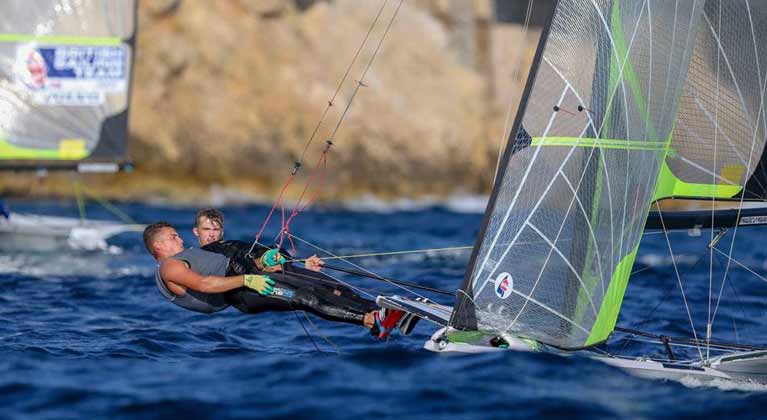
We had a poor start to the season at the Europeans in Gydnia. We were happy with our ISAF Worlds performance in Aarhus. We made a few critical mistakes which added a lot of points to our score but overall we were happy to finish in the Silver Fleet and gained a lot of experience.
When it came to the Junior World Championships in Marseille, France we felt in good shape and knew we had a chance to medal because we had seen all of the U23 guys throughout the season and knew what we were up against.
Food poisoning
In the training days before the regatta, I had food poisoning and couldn’t sail for three days so we only had two days on the water before the start of the regatta. We had a range of conditions from extremely light all the way to extremely windy. We started off with consistent top five results apart from one capsize on Day three of racing. We went into the final series in fifth having not yet won a race.
On day four the race committee got one race in where we finished 2nd before the mistral wind kicked in and started blowing over 25 knots. We were sent to the harbour to wait until the evening when the wind died down a bit. We got our first race win after a port tack start off the committee end and scrambled a 7th after a bad start in the last race of the day.
That was enough to make us overnight leaders with one more discard to come. On the final day of racing, we waited on the shore for a few hours because the wind was too unstable. When the wind did come in we were met with the mistral again. The launching signal was displayed and we headed out. They sent us out to the course close to the shore with time for two races in maximum conditions. In race one we were in a good top five position when I made a mistake with a tack and broke a tiller extension. We threw on the spare tiller extension from the boom and finished in ninth.
We were still leading the regatta by 3 points which we didn’t know at the time. We never think about points. We need a clear mind to carry out our jobs on the water. In the final race, we played it extremely safe on the start and tacked out right after a committee boat start towards the cliffs.
We were lifted on port until we got close to the cliffs when we could tack and cross the fleet. This is something we had learned about in previous days on this course. We defended the position and in the end extended a decent lead.
 Robert Dickson and Sean Waddilove take to the podium after an epic week Photo: Pierii/49er Class
Robert Dickson and Sean Waddilove take to the podium after an epic week Photo: Pierii/49er Class
The regatta wasn’t decided on the last day. It was all about consistency in our results throughout the week of racing as well as years and years of preparation. We had mostly top fives and only one result outside of the top ten in the regatta.



























